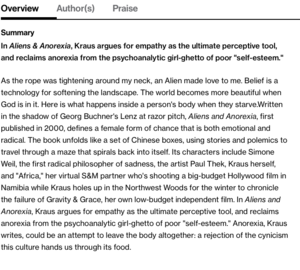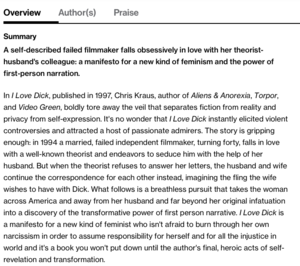Guest Lecture by Chris Kraus
LECTURE
Please prepare: by reading the following excerpt from Robert Gluck’s book Jack the Modernist File:Robert Gluck - Jack the Modernist.pdf. Make sure to print it so as to have it hand during the call!
The topic of this lecture is juicy: GOSSIP!
"gossip as legitimate art"
gossip is the casual or unconstrained conversation or reports about other people, typically involving details that are not confirmed as being true
ORIGIN: The word gossip is rooted in the Old English term, godsibb, recorded sometime around 1014, meaning “a child's godparent or sponsor at a baptism.” Over time, and after a number of spelling changes, gossip came to mean “a good friend, usually a woman.” By the 1500s, the word was mostly used for “idle chatter and rumor,” ...
Gossip as speculative (non-)fictions, vehicles for critique of authority.
We will be using Robert Gluck's text as a starting point for our discussion that will be followed by a short writing exercise!
BIO
Chris Kraus is a critic, filmmaker and author. She wrote I Love Dick, Aliens & Anorexia and various books on art criticism. An overview of work and links to writing as well as film work can be accessed through the following link: https://monoskop.org/Chris_Kraus
- Experimental approach to writing, auto-fiction. Using her own life as a case study, a site of theoretical speculation. In doing so, she manages to complicate the dichotomy between theory and practice. Who are perceived as those in the position to "generate knowledge"?
Both I Love Dick and Aliens & Anorexia show this experimental approach to writing - the revolutionary, disrupting potential of the first person narrator. What does it mean to claim the I?
"Chris Kraus’ texts show a great fascination with the figure of the artist as loser, which is most famously the case with her 1997 cult novel I Love Dick ... By valorizing losing as a mode of authenticity, Chris Kraus brings to the fore a tradition of subversion within a world of various coded rivalries (between men and women, between overt and shameful desire, between artists in the art market, etc.) and in doing so establishes the art of losing as a radical ethical position." 1
- Her writing is associated to the literary movement New Narrative .
Authenticity is paramount in New Narrative, and is possible with a variety of devices, including fragmentation, meta-text, identity politics, explicit descriptions of sex and undisguised identification with the author's physicality, intentionality, interior emotional life and external life circumstances. The New Narrative movement includes many gay and lesbian authors, and the works were greatly influenced by the AIDS epidemic in the '80s
2
New Narrative borrows from highbrow and lowbrow cultures — from canonical literature and from television, popular music, and pornography. 3
- Kraus is the co-editor of independent press Semiotext(e) (specified in critical theory, activist texts, art and philosophy). Common denominator of many the publications is that they don't easily fit into one genre, but remain rather genre defiant.
Aliens & Anorexia
is a book that runs parallel the attempted distribution of Kraus' film Gravity and Grace The book is a recounting of the movie production, its afterlife. The book in this way is a documentation of a documentation. The last chapter of the book concerns the script of the movie. This approach of re-mediating I thought interesting for us!
I Love Dick
is an epistolary novel (diary form), reappropriating a form of writing stereotypically conceived of as low art and feminine.
QUESTIONS / SUGGESTIONS
(please feel free to paste some thoughts and ideas here that I can forward before the meeting)


